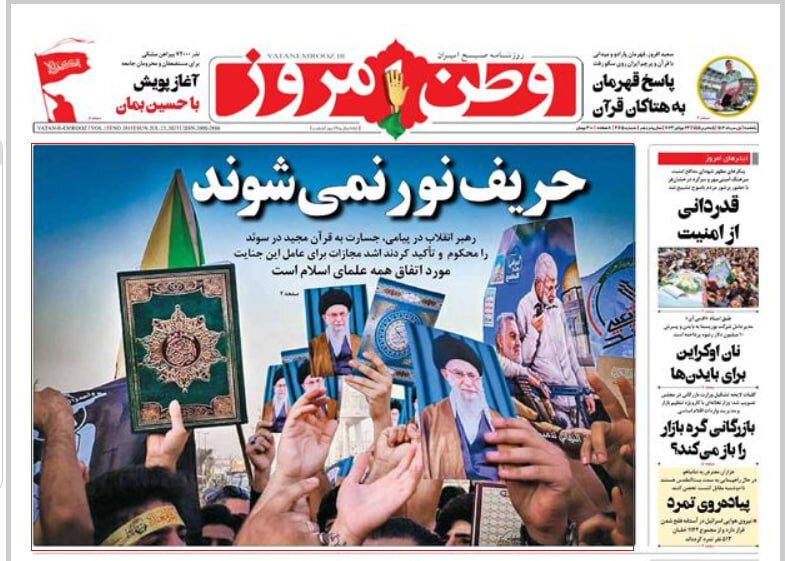Fear of Iran's revenge

In a commentary, Vatan-e-Emrooz wrote about the seizure of an oil tanker carrying the Iranian oil by the United States in April. It said: In Ordibehesht (April) of this year, the United States forced the tanker Suez Rajan, which was carrying Iranian crude oil to China, to change its route to the United States in obvious piracy.
But Washington faced a challenge to unload 800,000 barrels of seized Iranian oil in a Greek tanker and is unable to sell it, because they are afraid of Iran's revengeful action. The refusal of the American companies to unload Iranian crude oil from the tanker, which is caused by their fear of Iran's reaction, shows that, against the will of the American government, American companies have accepted the era of hit-and-run is over and any anti-Iran action will result in a decisive response from Iran. According to Western media reports, in response to the seizure of a tanker carrying Iranian oil, the Islamic Republic seized two tankers affiliated with America in just a few days. Therefore, American companies have the right to refuse to unload and auction off the cargo of the Suez Rajan tanker due to the fear of Iran's reprisal.
Iran: Bright horizon of Tehran-Cairo relations
In a note, the Iran newspaper addressed the successful negotiations between Tehran and Cairo and said: A few days after declaring the agreement to resume relations between Iran and Saudi Arabia, the security officials of Iran and Egypt have discussed with each other over the possibility of gradually developing relations in the future. However, in contrast to the military-political coalition proposed by the United States against Iran in the region, Egypt has signaled to Tehran that it intends to change the situation in its relationship with Tehran. Undoubtedly, the revival of relations between Iran and Egypt has been launched under the influence of the events that happened in the process of relations between Tehran and Riyadh. Considerations of the two countries due to the interests and goals that can be achieved in the event of the resumption of the relationship is an important case for the foreign policy decisionmakers of in both countries; in addition to securing bilateral interests, it can be an important variable and influence on the new arrangements of the Middle East and prevent from imposing excessive arms costs and costly regional confrontations, and at the same time bring the capacity of the two countries to realize security, economic interests and all-round diplomatic cooperation.
Shargh: Washington's destructive shows
Shargh wrote about the transfer of weapons, including fighter jets and a destroyer, by the United States to the region. The paper said: The military supplies of the United States, reinforcing military equipment to the east of the Euphrates and the Al-Tanf base, sending fighters to the country's bases in the Middle East and especially the Persian Gulf, along with military exercises and maneuvers in eastern Syria, etc., are all beyond the claim of fighting with instability or terrorism in Syria, because the Biden government is pursuing a balance against Russia in Syria through the Ukraine war. And considering military experiences as signs of war and not just applying political pressure, it seems that Washington is trying to create equations to reduce Iran's role in Syria, especially with the leakage of information leakage that the U.S. and Israel have plans to reduce Iran's presence in Syria and move this country away from the borders of Syria in the Golan Heights and the borders of Jordan. Now it seems that this scenario has become more prominent.
Javan: Repeated initiatives of the West to strike agreement with Iran
Javan wrote in an opinion piece: Iran's foreign minister has declared that Oman's "mediator" foreign minister has come to Iran "with new JCPOA initiatives". The truth is that the JCPOA was a king for itself in the previous government, but it was "almost nothing". Its repeated news had repulsed the society. Every day, there were plenty of news that "it will be implemented soon, Europe has promised, America cannot leave, the world will not obey even if America leaves”, and so on. Even now, the mediators do not influence the market and the market is smart! However, we cannot ignore the fact that Iran's strategy has changed from the years when "we followed begging diplomacy" and wanted to make the West obedient to our interests with "low-scale nuclear activities, removed centrifuges, and cement-poured power plants" to a strategy of "showing the power of nuclear assets" and an unwritten agreement has been created that some provisions of the JCPOA (from freeing money to sanctioned purchases) are being implemented by the West automatically. Are these initiatives limited to prisoner exchanges or do they lead to writing down these unwritten agreements? There is also a third way: "The West continues to pursue its best advantage, which is wasting time with Iran"!
Leave a Comment